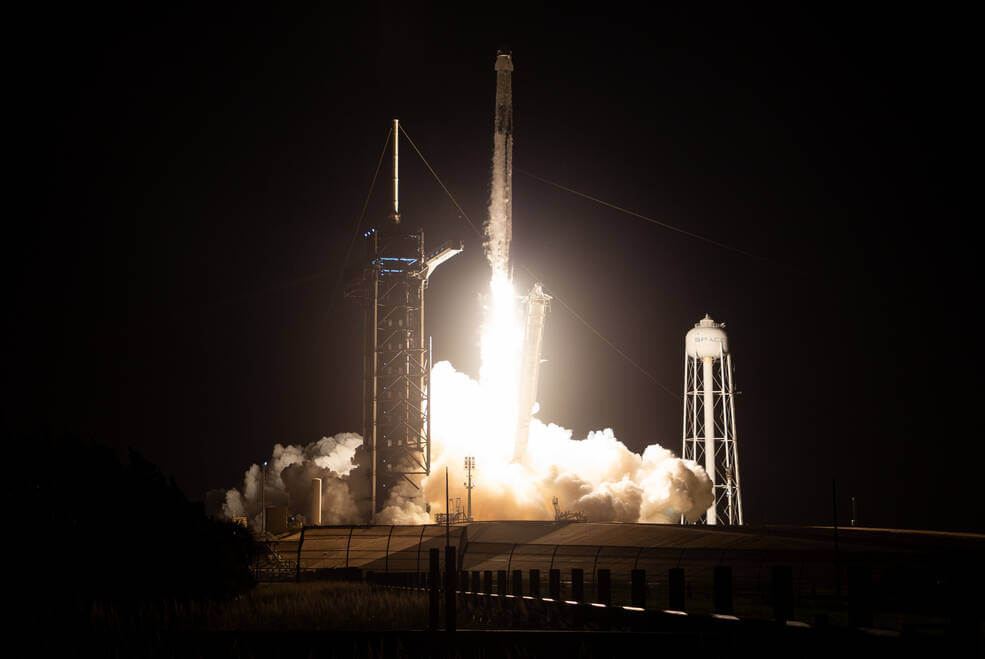When she was just a junior at Baldwin High School taking an advanced history placement course in the late 1990s, Jasmin Moghbeli stood out among the brightest of the brightest, said her teacher Joel Friedman, now retired.
“She got the highest grade in the class,” said Friedman. “She was the best student I had that year.”
Moghbeli went on to graduate from the Massachusetts Institute of Technology, the Naval Postgraduate School, and the U.S. Naval Test Pilot School, and became a Marine Corps helicopter pilot.
Now 40, Lt. Col. Moghbeli is a NASA astronaut and commander of Space X’s Crew 7, Expedition 69. Moghbeli, who was raised in Baldwin, flew the privately owned Space X to the International Space Station Aug. 27 and docked at the station the following day. She is one of four astronauts who boarded the space station that day, joining a crew of seven already on the station. Four have since departed for Earth.
Moghbeli, who is experiencing her first space flight, is scheduled to remain aboard the station for six months.
The experience is not only significant for Moghbeli, who will be leading a series of scientific experiments aboard the station, but also for emerging efforts to turn at least part of the effort to explore outer space toward private industry.
Space Exploration Technologies Corp., commonly known as Space X, is a spacecraft manufacturer, launch service provider and satellite communications company in Hawthorne, California, that was founded in 2002 by Elon Musk, owner of the social platform “X,” which used to be known as Twitter. Space X’s goal, Musk has said, is to reduce space transportation costs and, eventually, help colonize Mars.
The company, according to its website, operates the Falcon 9 and Falcon Heavy rockets, along with the Dragon spacecraft.
According to NASA, Space X is the first private company to develop a liquid-propelled rocket that has reached orbit; to launch, orbit and recover a spacecraft; and to send a spacecraft to the International Space Station.
Since the late 1950s, the space industry has been controlled by NASA, the National Aeronautics and Space Administration, which put astronauts in orbit in the early 1960s and, in 1969, was able to put the first human, Neil Armstrong, on the Moon.
But costs have always been high and NASA had to rely on private contractors – Boeing, Rockwell, McDonnell Douglas and Grumman Corp. — to provide rockets and, in the case of Grumman, the lunar lander that took Armstrong and Buzz Aldrin to the moon.
NASA ultimately moved on to the space shuttle, which looked much like a 747, in the 1980s. But two of the shuttles exploded, killing a total of 14 astronauts, and bringing to a halt America’s space program for nearly two years. The U.S. had to rely on Russia to get NASA astronauts to and from the space station, because it lacked any launch capabilities.
NASA’s troubles provided an edge for private industry, mostly for companies started by Musk and Richard Branson, who in 2004 started a space tourism company, Virgin Galactic. In 2021, Branson traveled as a passenger aboard one of his own spaceships on a mission that lasted about one hour and reached a peak altitude of 53.5 miles.
Long Island, with Grumman in the lead, was once a powerhouse in space. But Grumman’s spacefaring days ended when NASA’s Apollo program concluded in 1972.
But space business is still alive on the Island.
The industry is smaller and less prominent than in the Grumman days, but it does make money for the companies involved and keeps engineers employed.
Sintel Satellite Services Inc. in Plainview is a global telecom company that provides infrastructure and services using satellite, fiber and microwave.
Sanjay Singhal, who started the company in 1997, said in an interview that Sintel develops ground-based systems that aid mostly private communications satellites, but it also does some classified government work as well, including in Afghanistan and Iraq. Singhal said the company works in 55 countries, mostly through consultants in those countries. Singhal has also established a nonprofit that provides communications equipment in parts of the world that lack round-the-clock contact with other countries.
“There are a lot of opportunities for smaller companies in the space business,” Singhal told the Press. Private companies, he said, can keep down costs better than can government.
Certainly the space industry on Long Island is not as flashy as it was during Grumman’s heyday, when the famed TV newsman Walter Cronkite rubbed his hands together on screen and said, “Oh, boy!” as the first moon landing took place on July 20, 1969.
But Ken Peterman, president and chief executive of Comtech Telecommunications Corp. of Melville, which builds ground-based satellite equipment including antennas, modules and amplifiers, said the company has 14 U.S. locations and does some manufacturing in Melville, where it is headquartered.
The private space industry, Peterman told the Press “is growing enormously fast.”
“There is a need to connect for medical and educational purposes,” he said in an interview. He said he knows of 20 to 30 smaller companies that are planning to build space stations, and that he attended a conference recently, where about 120 companies expressed interest in developing rocket launch capabilities.
Can space work be done on high-cost Long Island?
That is a difficult question, given the region’s electric and housing prices, Peterman and others said. While constructing giant rockets may not be possible here, research, development and engineering space products could continue to be a growth opportunity.
Comtech has about 2,000 employees nationwide, including between 200 to 300 on Long Island.
Overall, Peterman said, the government is phasing out of the space business and turning it over to private industry.
“I would declare that a success,” he said.



































